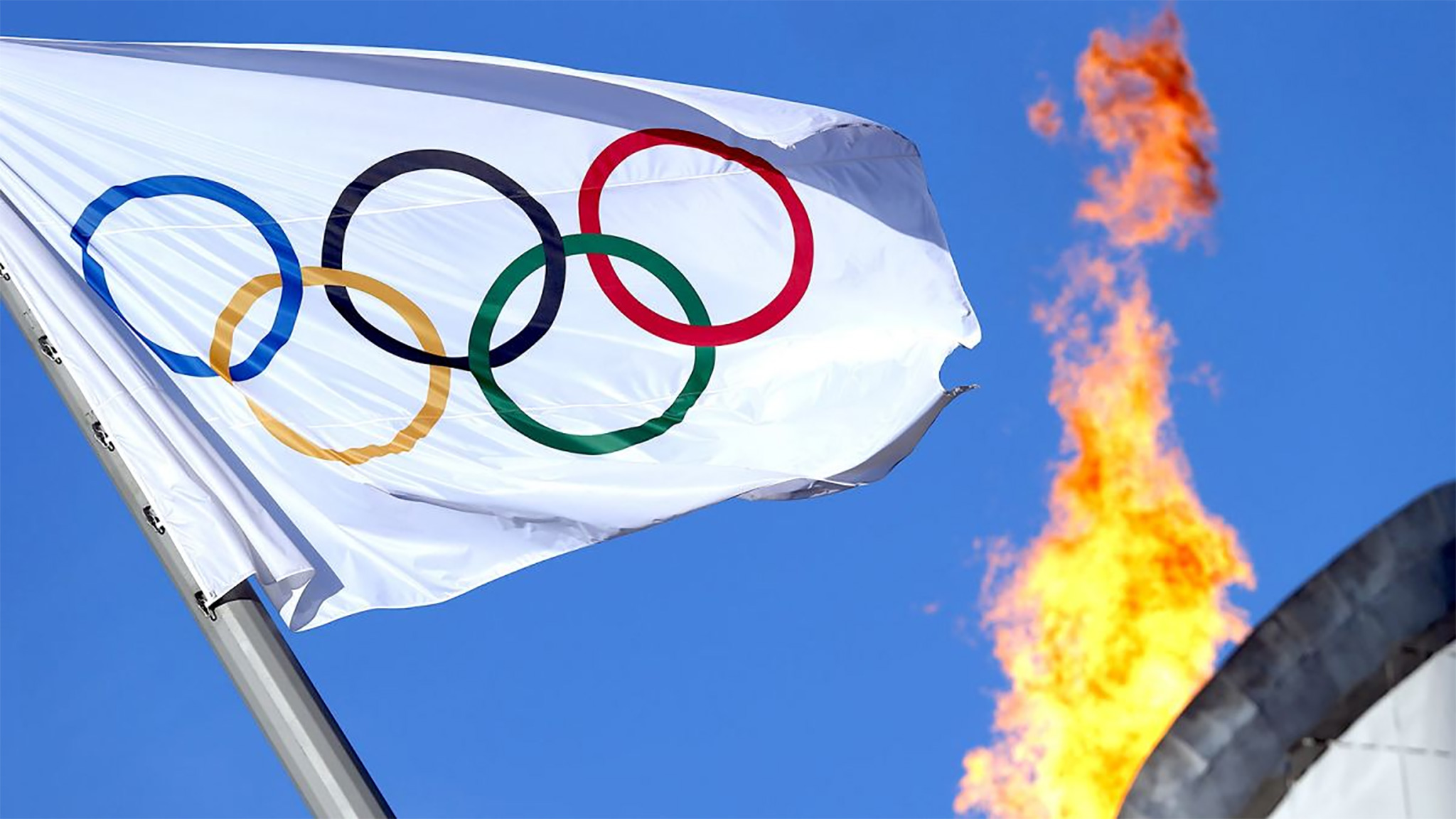
OLYMPIC PADDLETICS UPDATE: SUP has its day in the ‘Supreme Court of sport’ as the ISA vs. ICF saga continues
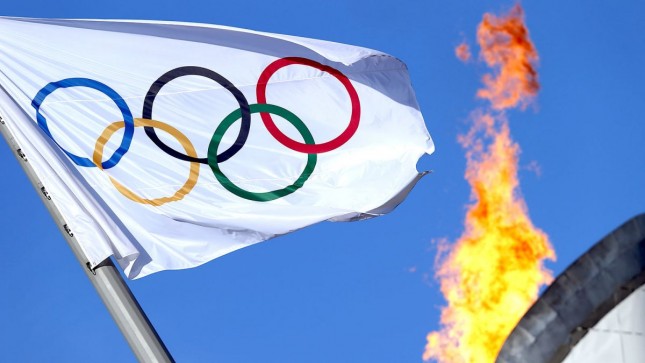
The fight for control of Olympic paddleboarding is heating up
Remember the whole political fight over SUP in the Olympics? The one between the International Surfing Association (ISA) and International Canoe Federation (ICF) over who has “control” of Olympic paddleboarding?
The one I referred to last year as the selfish parents debate — a story that even made the New York Times (as well as some great April Fool’s joke material).
Paddletics.
And remember how we all knew it was happening but none of us inside the core SUP community really knew what was happening?
Well now we know a little more, because earlier this month the Court of Arbitration for Sport (CAS) held a significant hearing in Switzerland where each side presented and debated their respective arguments.
SUP had its day in court … or rather, the two federations fighting to be in charge of Olympic SUP had their day in court.
And while I’d much prefer to spend my days paddling down long rivers in Canada and covering epic races in the French Alps, I believe the core SUP community deserves to know what’s happening behind closed doors when it involves the very future of our sport.
So I went digging.
PADDLETICS
In case you’ve been living under a rock (on Mars… with your fingers in your ears…) you’ll be familiar with the basic history:
The ISA and ICF have been locked in an arm-wrestle since early 2017 to determine which federation has the right to govern SUP on an Olympic level.
Having two federations interested in getting our sport into the Olympics is a luxury problem, but it’s still a problem. And things are getting messy.
The ISA has accused the ICF of showing up late to the party and spoiling its ability to get SUP into major events such as the Youth Olympics. On the flipside, the ISA used negative tactics to block the ICF, including encouraging its national surfing federations to ban any athlete that competes in an ICF event (fortunately very few nations followed that directive), as well as helping to legally block the ICF from even organising a world championship in the first place last year in Portugal.
Earlier this month, the ISA announced a last-minute “world championship” in El Salvador right before the court hearing in Switzerland that left many paddlers wondering if the surfing federation cared more about politics or paddling.
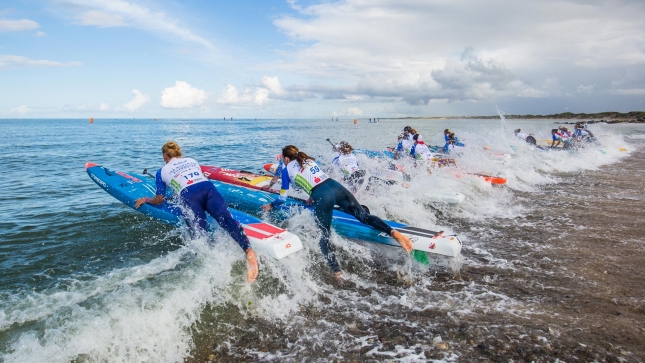
The 2017 ISA Worlds in Denmark (@benreedphoto)
While it’s expected that any two sporting federation will act in their own selfish interests – this is the real world, after all – the whole saga has hurt the paddlers and the sport itself more than anything.
It’s pretty clear the ISA has been more active in our sport since the inaugural ISA Worlds back in 2012 (there were ICF-affiliated SUP races as far back as 2010/2011, but the Worlds in China next week are the inaugural edition of its championship event). But it’s also pretty clear the ISA has been doing a fairly ordinary job of “governing” our sport — they’ve left the door wide open for the ICF to come in and potentially do it better.
LACK OF LEADERSHIP
If this sport was an actual democracy, ISA President Fernando Aguerre’s approval ratings would probably be at an all-time low among stand up paddlers. Athletes are frustrated, the ISA Worlds are being organised with six weeks’ notice, and a significant amount of the national surfing federations don’t care about SUP.
For many years there’s been a clear lack of leadership from the ISA and a clear lack of involvement from the ICF.
Many paddlers, myself included, initially thought the ICF’s bid for Olympic SUP was a long-shot campaign that would at least give the ISA a much-needed kick-up-the-ass and force it to lift its game. But the opposite has occurred: The ISA has retreated into its corner where it spends more time jumping at shadows and punching at ghosts than improving the sport of SUP. Now, suddenly, the ICF seems like a viable candidate.
Could the ICF do any better than the ISA? Perhaps, but that’s certainly not guaranteed. We’ll know much more after next week’s inaugural ICF Worlds in China (an event that’s shaping up to be very competitive).
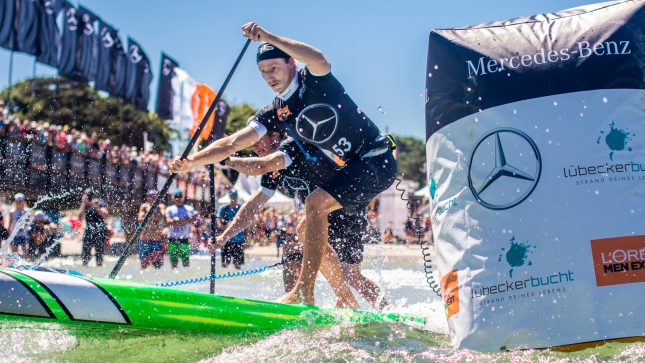
Lincoln Dews and Michael Booth will compete at the inaugural ‘ICF Worlds’ in China next week (photo: @georgiasphoto/@paddleleague)
But all of these points are largely moot, because modern sport is rarely a democracy. We don’t get to vote: The future direction of paddleboarding is being decided behind closed doors in Switzerland and seems to involve more lawyers than logic.
This process has been going on for two years but reached a significant milestone this month.
First there were mediation talks but they broke down after the ISA refused to compromise. The ICF was essentially arguing for “joint custody” of SUP where the ISA would focus on the waves and the ICF would govern everything else. The ICF claimed the ISA was unwilling to negotiate; the ISA claimed the ICF had unreasonable demands.
So off to CAS they went.
The Court of Arbitration for Sport is a Swiss-based institution that essentially acts as the “Supreme Court of sport.” Many of the cases it hears involve doping, while the Court’s “recent decisions” page lists many other Olympic-level hearings and even a few soccer cases (sorry, football) involving some of the most famous clubs in the world.
In other words, this is a pretty big court room for our humble little sport to be sitting in.
SURFING v. CANOE
Earlier this month, both the ISA and ICF sat down in Lausanne, Switzerland alongside their lawyers to argue their cases to an independent commissioner over the course of a few days.
I asked both federations to comment on the hearing, and while neither side was willing to divulge any details (non-disclosure agreements would forbid it anyway), they did at least take the time to respond.
The ICF got back to me through a spokesman who stated:
“We are glad to have been given the opportunity to state our case, and to once again show that we have the best interests of the stand up paddling community at heart. We’re looking forward to putting on a fantastic world championships next week, and sincerely thank everyone who has supported our event.”
While a member of the ISA executive gave me the following:
“We were very happy to present our case before CAS last week. This was an excellent opportunity for us to reaffirm the true facts and to highlight the ISA’s leadership, governance and development of SUP for the last decade. As the only entity entrusted with resolving such disputes in the Olympic Movement, CAS is the best forum to examine and cross-examine both sides thoroughly. As a result, we have complete confidence that CAS that will make the right decision in the interests of sport and the athletes, and support the ISA position. As the case is now pending before the CAS arbitrators, and the details confidential, we cannot comment further.”
Fortunately, while the federations wouldn’t or couldn’t say much about the legal process, I did locate a source in Switzerland that has intimate knowledge of both stand up paddling and CAS. This person wasn’t at the hearing but knew people who were, and together we were able to piece together what went down and what it all means.
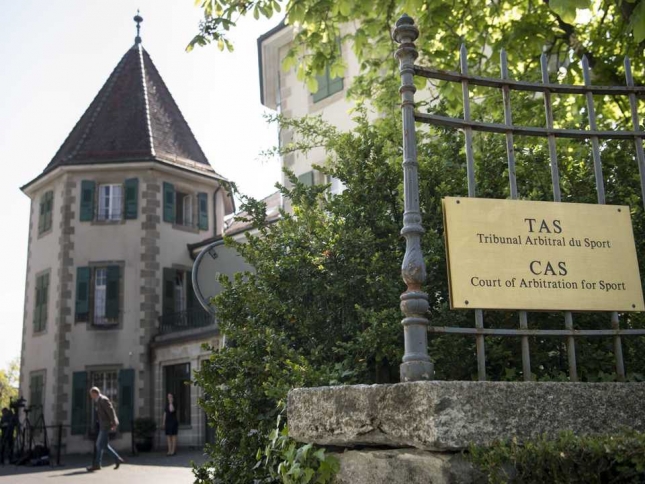
The Court of Arbitration for Sport in Lausanne, Switzerland
Like any standard court hearing, each side got to argue their case and cross-examine the other.
Apparently it all took place in front of an independent commissioner appointed by CAS who is in charge of the hearing. This person is the judge, for lack of a better term.
That “judge” was joined by two semi-independent commissioners, one nominated by the ISA, the other by the ICF. All three commission members are supposed to be neutral.
The lead commissioner will apparently make a decision before the end of the year, however it’s unlikely this will be a legally-binding resolution and may end up being referred back to the IOC for the final say. In other words, we may continue in limbo well into 2020.
(The fact the ICF has already chosen a date and location for its 2020 SUP World Championship shows it’s either going all-in or expects the saga to continue for the foreseeable future.)
Each federation was represented by their executive members: For the ISA, I believe that meant President Fernando Aguerre (who’s been running the Association since 1994) and Executive Director/former Olympic lobbyist Robert “Bob” Fasulo. On the other side, I believe ICF was led by its ‘Secretary General’ Simon Toulson who is essentially the CEO of the ICF.
Lawyers representing each federation were present and apparently did most of the talking.
THE EXPERT WITNESSES
It sounds like this was the core of the hearing, with each side bringing along a handful of “expert witnesses” that could bolster their respective cases.
The ISA was represented by its vice-president Casper Steinfath along with ISA gold medalist Candice Appleby. The CEO of the APP pro tour (which the ISA owns a 10% stake in) Tristan Boxford and the head of the Danish SUP federation (who organised the 2017 ISA Worlds) also presented their opinions.
I wasn’t able to confirm exactly who represented the ICF, but I presume it featured athletes that have a background in both SUP and canoe. That likely includes at least a couple of members of the ICF “SUP Commission,” which features former Israeli Olympian and original member of the Southern California SUP crew Rami Zur, ICF Vice-President Thomas Konietzko from Germany, current Russian canoe and SUP athlete Andrej Kraytor, PaddleGuru founder Tim Hornsby from the USA, one of Germany’s original SUP athletes Olaf Schwarz, the “father of European windsurfing” and Lost Mills race founder Ernstfried Prade, and Italian stand up paddler Sheila Palermo.
As you’d expect from a court case, these “expert witnesses,” while indeed experts, were chosen by each side to ensure they’d follow the company line. One of the ISA’s original witnesses — a widely respected industry veteran — never received a call back after giving them a preliminary statement that he presumes wasn’t one-sided enough for the ISA’s liking.
It’s also unfortunate that the independent commissioner didn’t invite independent witnesses that could give actual independent evidence. It sounds like this was basically a “he said/she said” kind of hearing.
WHO SAID WHAT?
This is where it gets vague because nobody wants to talk on record. But I believe the core SUP community deserves to know what’s happening, so I kept digging. Fortunately, my source in Switzerland got enough snippets to piece together the edges of the puzzle.
For one, it sounds like both sides were focused on technical arguments. Key themes of the hearing included which federation was the first to support SUP, whether the definition of SUP makes it a surfing or canoeing sport by default, and whether a race board looks more like a surfboard or a canoe.
The ISA in particular has been criticised by segments of the core SUP community for being stuck in its one-track mind of “Hey we were here first!” — an argument that does very little to help push the sport forward — while the ICF has been criticised for arguing that SUP is under its umbrella by default despite its limited history of engagement.
It’s quite disappointing that this whole process is happening behind closed doors in the first place, and it’s even more disappointing that each side is arguing over technicalities rather than doing the obvious thing: Presenting their case directly to the community and explaining why they would be good leaders for the sport.
We’ve seen a little of this from both sides, and I’m optimistic the ICF will take the time to speak (and listen) to paddlers during the World Championship in China next week (and hopefully the ISA does the same in El Salvador). But neither federation has been particularly proactive in stating their case for the future of SUP to the actual people who practice the sport. Neither side has even shown they know what the future of SUP should look like let alone how to guide us there.
We, the SUP community, want to hear less from the lawyers and more from the federations about their plans (if they have one) for stand up paddling’s future. Enough of the debates — what we need is forward-thinking, future-looking leadership.
THE FUTURE
Despite the clear temptation to look at this whole Olympic saga through cynical eyes and paint it as a political power-play between two federations that are semi-detached from the sport they each claim to represent, I believe both federations include several individuals who are genuinely passionate about paddling, and I firmly believe both federations can actually offer a lot to our sport.
The ISA can easily connect us with the cool, marketing-friendly world of surfing and the lifestyle it brings. It can take us to the waves and offer racing that is spectator-friendly, something that’s critically important for a sport that has always struggled to find a real audience beyond the boundaries of our small tribe.
The ICF, on the other hand, can connect us with tens of thousands of canoe clubs and events around the world to help grow participation and reinforce our sport from the grassroots level. It can tap into that “inland” paddling market that is much larger than the coastal communities.
Canoe races are much bigger than SUP events in terms of participation, which is something we can piggyback on. Just last week we saw the famous Krumlovsky River Marathon where over 1000 canoe/kayak paddlers joined almost 200 SUPs on the water (and that isn’t even the biggest event in the Czech Republic — there’s another canoe race that has over three thousand participants).
It’s also worth noting that “canoe sports” is a much larger industry than SUP and could potentially help our sport revive its flagging business fortunes. Plus, the ICF can lend its decades of expertise in organising events to the immature sport of SUP that often struggles with professionalism.
And both the ISA and ICF can potentially get us into the Olympics, because both federations are now embedded inside the Games after surfing received entry for Tokyo 2020 and looks likely to be reconfirmed for Paris 2024 and surf-friendly L.A. 2028 (the ICF has been a federation since the 1920s and would arguably be able to fast-track SUP’s inclusion as they have far more gold medal “slots” available than the ISA).
Like I said earlier, many paddlers in the core SUP community question whether we should even be chasing the Olympics to begin with. Is it worth it? Will it even help the sport in the long run? Did the Olympics do anything for windsurfing, for example?
Either way, while this whole “paddletics” debate is framed around the Olympics, I actually think both federations can do more to help our sport outside of the Olympic movement. So whether we care about stand up paddleboarding in the Olympics or not, we need to find a resolution to this political saga.
WHAT’S THE SOLUTION?
In a perfect world there would be some sort of compromise, but it seems egos and political agendas are getting in the way of logic and a love of the sport. The ICF has said it’s still willing to negotiate, but the ISA seems to be set in its ways and isn’t likely to change course. Pigs will fly before these two federations work together.
In the end, the ones who can push for a resolution are the members of the “core SUP community” that I keep alluding to. That includes the professional (and serious amateur) athletes, the board manufacturers and other key industry stakeholders, along with proactive leaders in the media and major event organisers.
But the problem with the “core SUP community” is that it isn’t represented by one single body. The athletes are divided by ego and rivalry, the brands are split by competing business interests, and the other stakeholders are often too busy managing the actual sport on the ground to put any time, energy or genuine interest into this legal and political dog-fight.
Of course, we don’t actually need the federations. We already have “leadership” in the form of event organisers, regional race series, industry stalwarts, passionate paddlers and embedded media — 99% of SUP events around the world aren’t affiliated with either federation.
All we really need from the federations is engagement and a little guidance (and vice versa).
If I were the ICF or ISA, I’d be going out of my way to help setup a truly independent SUP commission that operates externally but works directly with the federation to help push the sport forward and helps make key decisions, and then I’d be broadcasting the commission’s decisions and activities to the core SUP community to make everyone feel like they’re part of this process.
To me that seems fairly obvious, but so far I haven’t seen anything like this from either the ISA or ICF. Perhaps this latest round of paddletics will be the catalyst…
Whatever happens, I think it’s rather fitting that both the ICF and ISA will run competing “SUP World Championships” within a month of each other — starting next week with the ICF Worlds in Qingdao, China and continuing with the ISA Worlds in El Salvador at the end of November. Perhaps then we’ll get a clearer indication of which Federation has the best interests of our sport at heart, and which federation is truly capable of joining the core community in leading the sport forward.
Because the future of our sport should be decided on the water, not behind the closed doors of a courtroom in Switzerland.
Thoughts? Join other paddlers in sharing your opinion on the original Facebook thread.
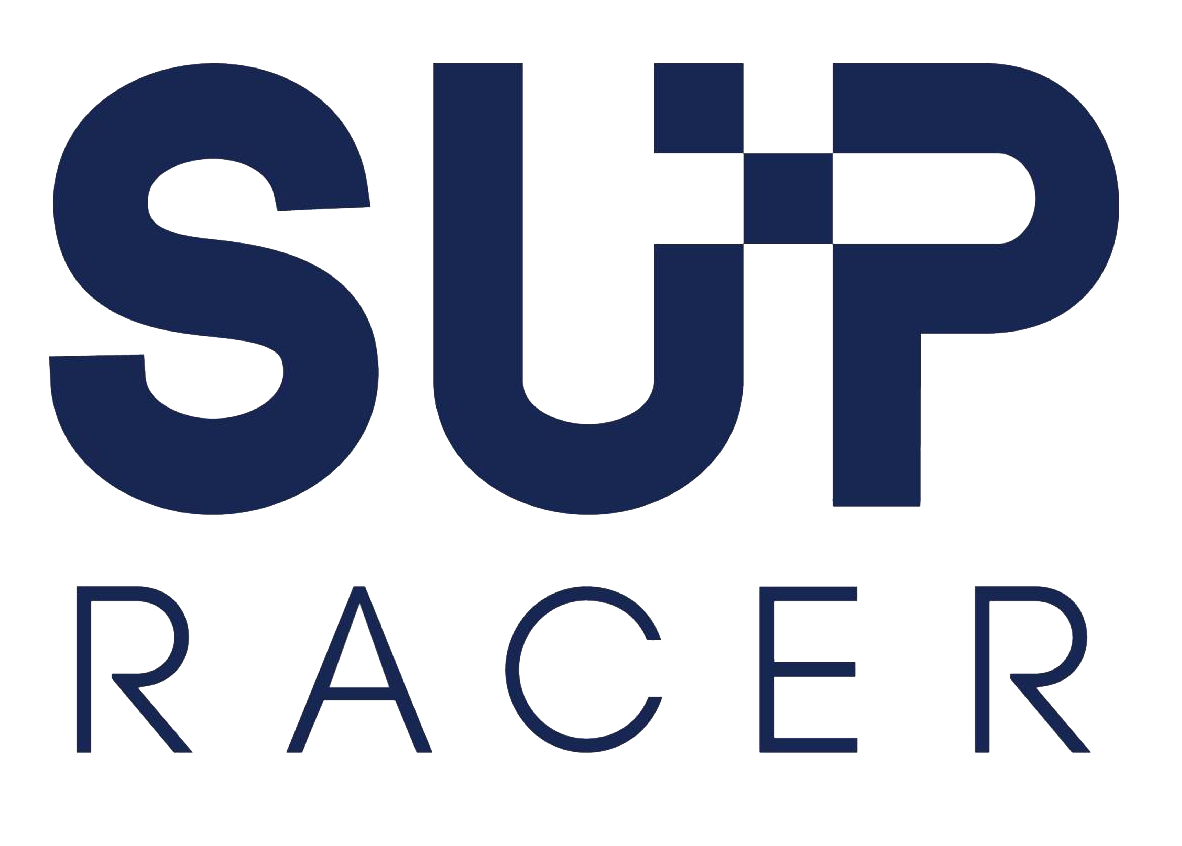


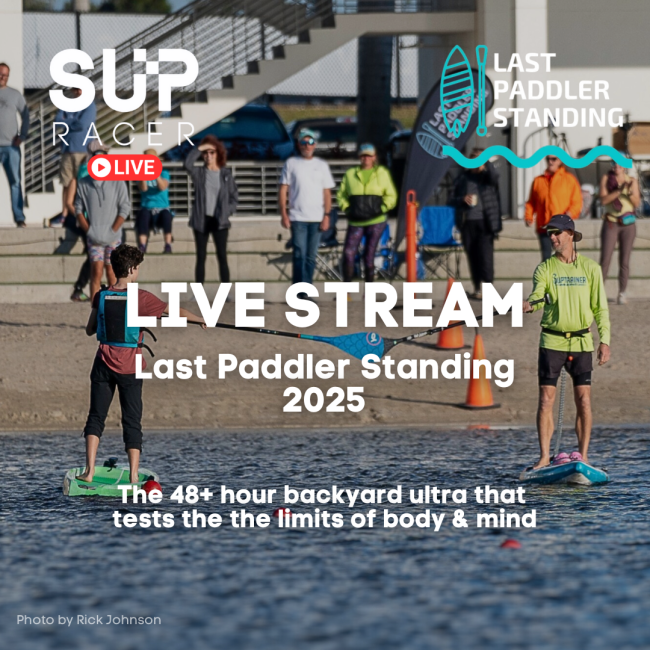
You must be logged in to post a comment.